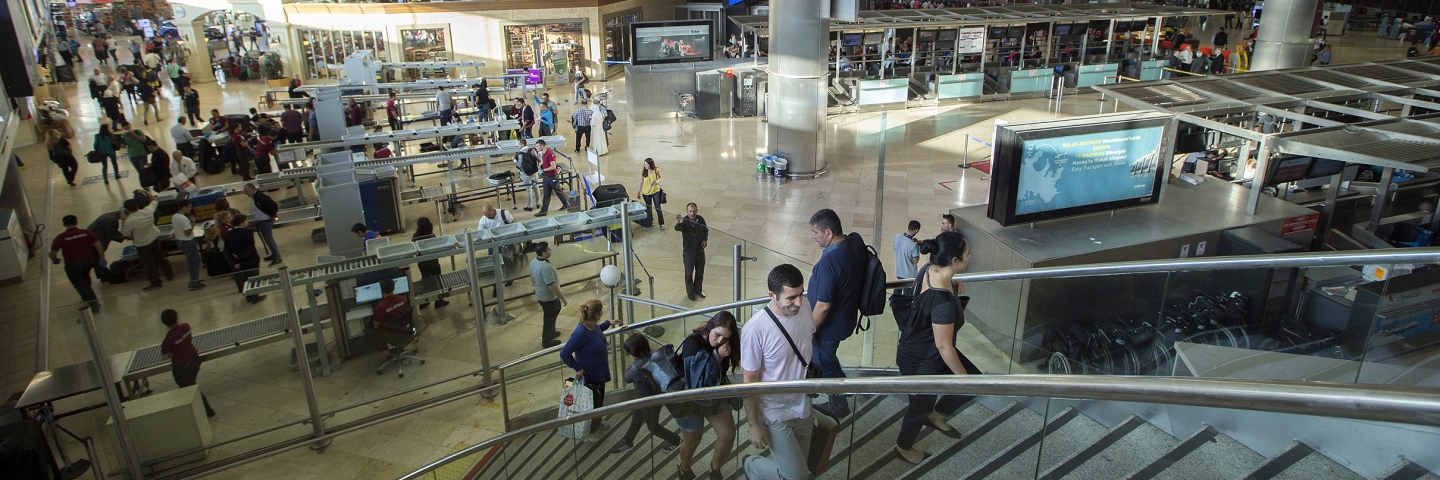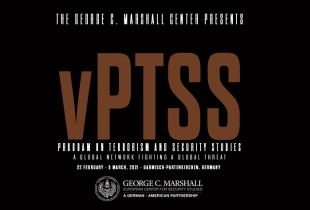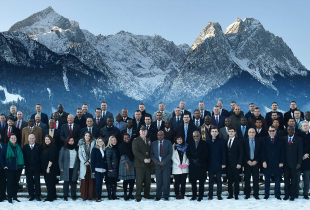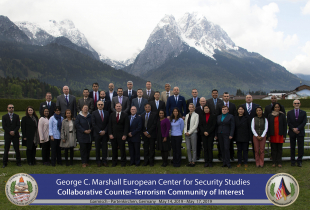
Securing Borders Against Traveling Terrorists: Challenges, Best Practices, and Recommendations
Recommendations from the Counterterrorism Alumni
Ten alumni of the Daniel K. Inouye Asia Pacific Center’s (DKI APCSS) Comprehensive Security Responses to Terrorism (CSRT) course and fourteen alumni of the George C. Marshall European Center’s (“Marshall Center”) Program on Terrorism and Security Studies (PTSS) course participated in a first-of-its-kind collaborative CT-COI in Garmisch-Partenkirchen, Germany to discuss and exchange ideas, share best practices, and make recommendations for securing national borders against traveling terrorists. Participants heard from eleven alumni representing nine countries and FRONTEX on current border security challenges and how these challenges are being addressed. The COI concluded with the following observations and recommendations.
Good Border Security Requires an Investment in People
Good border security begins with the people charged with securing the borders. Accordingly, for a country to have a professional border security force (e.g., one less inclined to engage in corruption), the force must be valued as a respected integral part of the national security team. Countries must recruit qualified motivated individuals from society, vet these individuals thoroughly, establish realistic professional-development programs, supply forces with the tools necessary to do the job (including access to necessary databases), and provide adequate compensation and incentives, such as promotion opportunities and performance-based bonuses, that permit a respectable quality of life. Participants also emphasized the importance of meaningful deterrents to corruption, as well as full accountability for violation of established laws and policies.
Professional Training
The key to an effective border security force is a continuing professional development program, allowing border security force members to remain current while enhancing their knowledge, skills, and abilities. Training regimens should include periodic updates on current and evolving trends in terrorist travel and methodology, as well as lessons learned and best practices for identifying and countering illegal activities. Participants further recommended cross-training events, such as joint and inter-agency exercises, in order to develop familiarity, trust, and a common understanding of respective roles, responsibilities, and particular capabilities of the different government and non-governmental agencies involved. The importance of having specifically trained experts, such as linguists, “cultural mediators,” and specialists in document fraud was also highlighted. Finally, training programs should include a system of audits, spot checks, and testing to gauge knowledge retention and to guard against complacency at the border.
Information Sharing
Another often-cited necessity was the enhanced ability to share information, both internally and internationally, in order to ensure critical information reaches frontline practitioners in a timely manner. Fundamentally, this requirement necessitates a shift in organizational culture from a “need to know” to a “need to share” mindset. It also requires technical infrastructure and streamlining of processes. Specific recommendations included the establishment of fusion centers responsible for coordinating among the various national agencies that could also serve as conduits for the exchange of information at the international level. Along similar lines, it was suggested that information regarding terrorist travel, human smuggling, and human trafficking should be consolidated, either within a single database or by way of enhanced interoperability between existing databases, in order to facilitate the detection of links between terrorism, crime, and migration. Most importantly, participants recognized the need for enhanced information sharing with those who need it most – the men and women manning entry/exit points at airports, seaports, and land border crossing points.
Outreach
Participants emphasized that government counterterrorism agencies cannot detect and prevent terrorist travel alone, and must rely on a range of different partners. As such, they noted the need to build trust with border communities, non-governmental organizations, the private sector, as well as with workers in asylum centers, in order to raise awareness so that suspicious activities are more easily and readily reported.
Technology and Other Measures
Although human resources were viewed as the priority, participants recommended that countries incorporate new technology, in particular biometric identity documents and related systems. Several participants also emphasized the added value of unmanned aerial vehicles (UAVs) and remote sensors, while acknowledging these tools are often costly and are not infallible. While primarily applied to air travel, consideration should be given to extending the use of Advance Passenger Information (API) and Passenger Name Record (PNR) systems to all means of international transport, including maritime and rail. Despite clear added value of such initiatives, participants cautioned against an over-reliance on technology, noting that traditional low-tech tools, such as dogs, are still essential and must not be overlooked.
Legal/Policy Considerations
In a final set of recommendations, participants advised the strengthening of legal frameworks to counter terrorist travel, as well as illegal immigration, human smuggling, and corruption. Legislative changes were also seen as necessary to enable more effective intra-governmental cooperation, in addition to bilateral and multilateral agreements to enhance international cooperation. Finally, participants suggested that countries should develop national strategies and action plans specifically focused on countering international terrorist travel.
About the COI
This initial weeklong collaborative CT COI significantly enhanced the value of the CT-focused alumni network from the Marshall Center and the DKI APCSS by strengthening ties and providing the forum for a productive exchange of perspectives and experiences of these practitioners, and a vehicle for partners and stakeholders to engage with, support, and benefit from their work.
About CSRT
The Comprehensive Security Responses to Terrorism course at DKI APCSS is a four-week program that provides advanced professional education to counterterrorism practitioners with greater understanding of the subject in order to reduce the scope and capability of terrorism threats. CSRT builds a network of security professionals dedicated to combating terrorism by helping their countries to successfully collaborate and cooperate in a united struggle against terrorism. It also helps engender trust necessary for increased information sharing and identify ways to reduce cultural obstacles to cooperation in the international struggle against terrorism.
About PTSS
The Program on Terrorism and Security Studies course is a four-week resident program that supports the Marshall Center’s increasing emphasis on transnational threats and challenges. The PTSS provides advanced professional education to those charged with understanding and then reducing the scope and capability of terrorism threats. Recognizing the global nature of terrorism and its disdain for international borders, today’s PTSS attracts participants from all corners of the globe. The PTSS builds a network of security professionals dedicated to the mission of combating terrorism by helping their countries cooperate in the global struggle against terrorism.
For Academic Citation
Tom Welsh, “Securing Borders Against Traveling Terrorists: Challenges, Best Practices, and Recommendations,” Marshall Center Perspectives, no. 11, October 2019, https://www.marshallcenter.org/en/publications/perspectives/securing-borders-against-traveling-terrorists-challenges-best-practices-and-recommendations-0.
About the Author
CAPT Tom Welsh, JAGC, U.S Navy, was the Military Professor of International Law and Deputy Course Director for the Program on Terrorism and Security Studies at the George C. Marshall Center.
The George C. Marshall European Center for Security Studies
The George C. Marshall European Center for Security Studies in Garmisch-Partenkirchen, Germany, a German-American partnership, is committed to creating and enhancing worldwide networks to address global and regional security challenges. The Marshall Center offers fifteen resident programs designed to promote peaceful, whole of government approaches to address today’s most pressing security challenges. Since its creation in 1992, the Marshall Center’s alumni network has grown to include over 13,985 professionals from 157 countries. More information on the Marshall Center can be found online at www.marshallcenter.org.
The articles in the Perspectives series reflect the views of the authors and are not necessarily the official policy of the United States, Germany, or any other government.


